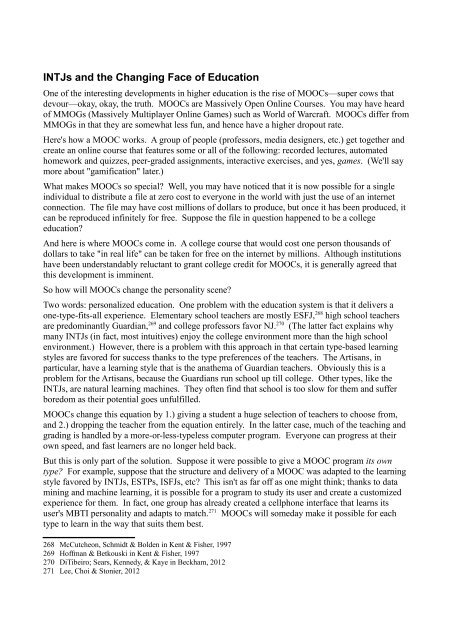Create successful ePaper yourself
Turn your PDF publications into a flip-book with our unique Google optimized e-Paper software.
INTJs and the Changing Face of Education<br />
One of the interesting developments in higher education is the rise of MOOCs—super cows that<br />
devour—okay, okay, the truth. MOOCs are Massively Open Online Courses. You may have heard<br />
of MMOGs (Massively Multiplayer Online Games) such as World of Warcraft. MOOCs differ from<br />
MMOGs in that they are somewhat less fun, and hence have a higher dropout rate.<br />
Here's how a MOOC works. A group of people (professors, media designers, etc.) get together and<br />
create an online course that features some or all of the following: recorded lectures, automated<br />
homework and quizzes, peer-graded assignments, interactive exercises, and yes, games. (We'll say<br />
more about "gamification" later.)<br />
What makes MOOCs so special? Well, you may have noticed that it is now possible for a single<br />
individual to distribute a file at zero cost to everyone in the world with just the use of an internet<br />
connection. The file may have cost millions of dollars to produce, but once it has been produced, it<br />
can be reproduced infinitely for free. Suppose the file in question happened to be a college<br />
education?<br />
And here is where MOOCs come in. A college course that would cost one person thousands of<br />
dollars to take "in real life" can be taken for free on the internet by millions. Although institutions<br />
have been understandably reluctant to grant college credit for MOOCs, it is generally agreed that<br />
this development is imminent.<br />
So how will MOOCs change the personality scene?<br />
Two words: personalized education. One problem with the education system is that it delivers a<br />
one-type-fits-all experience. Elementary school teachers are mostly ESFJ, 268 high school teachers<br />
are predominantly Guardian, 269 and college professors favor NJ. 270 (The latter fact explains why<br />
many INTJs (in fact, most intuitives) enjoy the college environment more than the high school<br />
environment.) However, there is a problem with this approach in that certain type-based learning<br />
styles are favored for success thanks to the type preferences of the teachers. The Artisans, in<br />
particular, have a learning style that is the anathema of Guardian teachers. Obviously this is a<br />
problem for the Artisans, because the Guardians run school up till college. Other types, like the<br />
INTJs, are natural learning machines. They often find that school is too slow for them and suffer<br />
boredom as their potential goes unfulfilled.<br />
MOOCs change this equation by 1.) giving a student a huge selection of teachers to choose from,<br />
and 2.) dropping the teacher from the equation entirely. In the latter case, much of the teaching and<br />
grading is handled by a more-or-less-typeless computer program. Everyone can progress at their<br />
own speed, and fast learners are no longer held back.<br />
But this is only part of the solution. Suppose it were possible to give a MOOC program its own<br />
type? For example, suppose that the structure and delivery of a MOOC was adapted to the learning<br />
style favored by INTJs, ESTPs, ISFJs, etc? This isn't as far off as one might think; thanks to data<br />
mining and machine learning, it is possible for a program to study its user and create a customized<br />
experience for them. In fact, one group has already created a cellphone interface that learns its<br />
user's MBTI personality and adapts to match. 271 MOOCs will someday make it possible for each<br />
type to learn in the way that suits them best.<br />
268 McCutcheon, Schmidt & Bolden in Kent & Fisher, 1997<br />
269 Hoffman & Betkouski in Kent & Fisher, 1997<br />
270 DiTibeiro; Sears, Kennedy, & Kaye in Beckham, 2012<br />
271 Lee, Choi & Stonier, 2012




